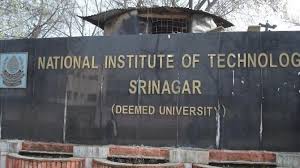Mehmood ur Rashid
 What happened at NIT, Srinagar can be neatly sliced into two. First, the spontaneous, second, the sponsored. The spontaneous part of it is the expression of jubilation by the Kashmiri students when West Indies defeated Indian cricket team in the semifinals of T20 world cup. The reason for jubilation was not the victory of West Indies, but the defeat of Indian cricket team. And this is nothing new to Kashmir. This has always been so. I remember in my boyhood days when Pakistan lost to Australia in the semifinals of the cricket world cup, the entire town was grieved over the defeat. In the next semifinals England was to play against India. The grieving town that it was just yesterday turned into a site of jubilation when England won the match and India cricket team was out. Now hold it for a while. Just around the same time one of our town-mates had suffered a bereavement in the family. When India lost to England he was part of a pack of young who would talk about the days game post match, standing on a road side in the market, and express their feelings. This is how he summed it up: “I suffered a bereavement in my family just the other day and was completely saddened. Today when England defeated India, joy returned to me and my family.” To the nuthouse that the Indian media has turned into, how do you explain that. This man was anti-national, an ISI agent, and a Pakistani stooge! He was paid by the ‘separatists’ for celebrating Indian cricket team’s defeat! The ‘nation’ that every night fires up to know what is happening in Kashmir, doesn’t actually want Indians to know what is happening in Kashmir. The spontaneous act of celebrating the defeat of Indian cricket team at the hands any cricket team in the word, let alone Pakistan, is only a way to convey how a Kashmir views at India in terms of emotional and personal relation. The unbidden, instinctual expression of joy is a reverse way of mourning. A mourning over the loss of political selfhood, over the loss of national selfhood. Kashmiris rupture into jubilance when they find that those who robbed them off their selfhood stand defeated in the game of cricket. It is a loud statement on how Kashmir is related to India. And india would be only better off if they read the text and the meaning that it carries. That is what happened at NIT. A spontaneous expression of joy over the defeat of Indian cricket team; a country perceived as a tormentor.
What happened at NIT, Srinagar can be neatly sliced into two. First, the spontaneous, second, the sponsored. The spontaneous part of it is the expression of jubilation by the Kashmiri students when West Indies defeated Indian cricket team in the semifinals of T20 world cup. The reason for jubilation was not the victory of West Indies, but the defeat of Indian cricket team. And this is nothing new to Kashmir. This has always been so. I remember in my boyhood days when Pakistan lost to Australia in the semifinals of the cricket world cup, the entire town was grieved over the defeat. In the next semifinals England was to play against India. The grieving town that it was just yesterday turned into a site of jubilation when England won the match and India cricket team was out. Now hold it for a while. Just around the same time one of our town-mates had suffered a bereavement in the family. When India lost to England he was part of a pack of young who would talk about the days game post match, standing on a road side in the market, and express their feelings. This is how he summed it up: “I suffered a bereavement in my family just the other day and was completely saddened. Today when England defeated India, joy returned to me and my family.” To the nuthouse that the Indian media has turned into, how do you explain that. This man was anti-national, an ISI agent, and a Pakistani stooge! He was paid by the ‘separatists’ for celebrating Indian cricket team’s defeat! The ‘nation’ that every night fires up to know what is happening in Kashmir, doesn’t actually want Indians to know what is happening in Kashmir. The spontaneous act of celebrating the defeat of Indian cricket team at the hands any cricket team in the word, let alone Pakistan, is only a way to convey how a Kashmir views at India in terms of emotional and personal relation. The unbidden, instinctual expression of joy is a reverse way of mourning. A mourning over the loss of political selfhood, over the loss of national selfhood. Kashmiris rupture into jubilance when they find that those who robbed them off their selfhood stand defeated in the game of cricket. It is a loud statement on how Kashmir is related to India. And india would be only better off if they read the text and the meaning that it carries. That is what happened at NIT. A spontaneous expression of joy over the defeat of Indian cricket team; a country perceived as a tormentor.
The reaction from the non-Kashmiri students is also understandable. For them India is a country and a nation that is theirs. If someone celebrates its defeat, it is bound to infuriate them. So they had their way of expressing anger, and a binding grief over a defeat that saw India out of the contest.
The clash between these contrary expressions is a matter related to the college administration that can be handled if students from both the groups are counselled, and made to understand each other. It needs an application of parental care. The coming in of police in the picture is unfortunate and impinges adversely on the academic atmosphere of an institution. But from this onwards is a story of sponsored hatred. Thanks to Indian politics and Indian media that always finds Kashmir as a lab for experimenting the evil. A malevolent media that has found a substitute in sensation for substance, in anger for analysis, and in violence for views.
While that spontaneity is Kashmir’s collective asset, and needs more matured and productive upbringing than just a jubilation over Indian cricket team’s defeat, the sponsored part of it is worrying. Kashmir’s core politics remains unchanged, in a nutshell. The political onslaught from Sheikh Sahab to Mufti Sahab, and all the military programs spread over these seven decades have failed to steal myself from me, but the sponsored hatred is a threat to Kashmir. It makes us vulnerable to misrepresentation, and thus threatens our lives and the belongings of life. As a matter of fact Kashmiris cannot live in isolation. They have to interact with the rest of India, in terms of business, education and other societal contacts. The sponsored hatreds want to shrink our spaces of living. We must take care of that. And then India as a people is not a monolith. If there are hate sellers, there must be people who are equally pained at this hate business. Kashmir needs to find a way to remain in touch with them. When an atmosphere of hate takes over, it makes it difficult for both the ends to take any positive initiative. And then under this blanket of manufactured hate, a common man in India is made to suffer in hundred different ways. Why should Kashmir provide an excuse for these malevolent hate sellers to mislead millions in India. No wonder most of the non-Kashmiri students at NIT Srinagar would make a part of that oppressed millions. Kashmiri students can think in terms of establishing a human communication with them; thus paving way for a grass roots level dialogue, wherefrom the politics of this entire region can benefit. This is an enterprise in patience and wisdom. For this it’s better we switch off the TV channels that produce loads of madness in the name of a non-existent notion of a nation. It’s better that the evil screen turns off from our side. We don’t need them to mediate our relations with a common man in India. We can throw open the human channels. We can talk in a un-enraged atmosphere. We are no one’s enemies, and we only want to tell others that don’t fall prey to those who benefit from making you behave like our enemies. We can all celebrate our political selfhood. We can all have our own share of azadi, and our own moments of joy and sorrow.
PS: It’s no new black; it was West Indies then, it’s West Indies now! From 1983 to 2016, the ground is unchanged.




